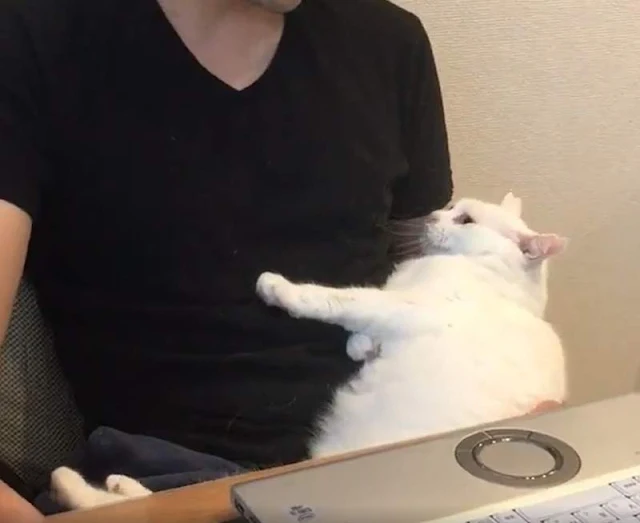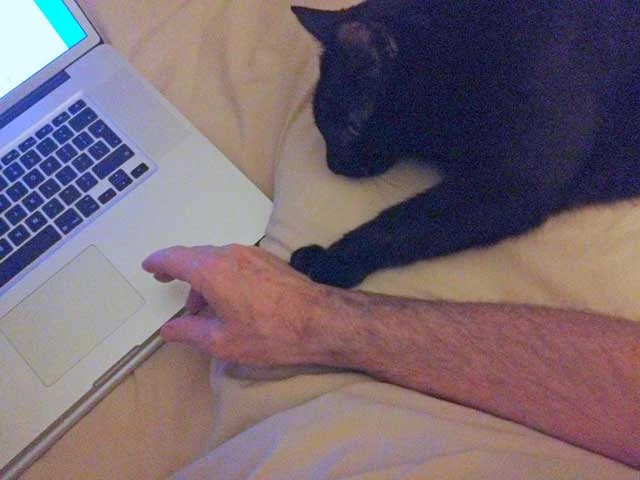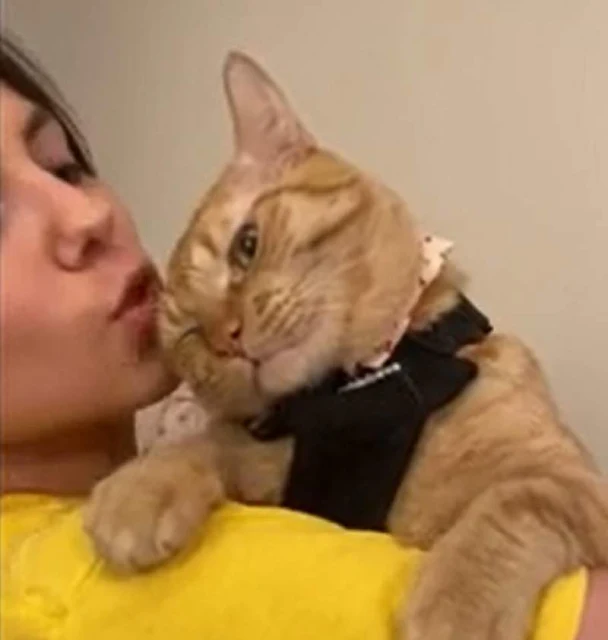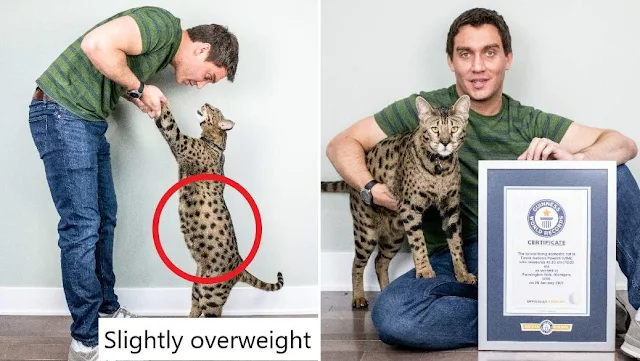 |
| Male cat has 'sex' with bed clothes. Screenshot. |
Sunday, 30 October 2022
Male cat has 'sex' with bed clothes
14-year-old cat head butts 1.5-year-old child
Saturday, 29 October 2022
Anger in the community as alleged multiple cat killer appears in court
 |
| Accused cat killer in court. Screenshot from video below. |
The video explains the story. It is pretty horrible, but the guy is innocent until proven guilty as we all know. The protesting ladies are sure that he is the cat killer because he was captured by a security camera abducting one of the cats and the footage is sufficiently clear to identify the individual.
The guy is 18-years-of-age. He looks much older.
EV charging point sign looks like a cat charging point sign!
EV stands for electric vehicle as you probably know. Charging points are springing up around various countries where the sales of EVs are sometimes outstripping diesel-engine cars. And so, we have charging points in public places. And in this instance, we have a car charging point sign which looks like a cat charging point sign because the sign is tipped up vertically. If you flip the sign through 90 degrees to the right (turn the picture on its side), you will recognise the outline of a vehicle.
 |
| Image: Nigel Stewart |
The person who spotted it said:
"Woah, didn't know you could get electric cats. Can finally get rid of my petrol one."
Here it is flipped through 90 degrees to the right.
 |
| Image as above. |
The sign is outside a supermarket chain in the UK called Morrisons. Nigel Stewart had nipped down to his local Morrisons in Kirkham, Lancashire to get some bits and bobs for his dog, a nine-year-old Cavachon Fozzie when he spotted the interesting sign.
I wonder if the draughtsman who drew the image thought the same thing. I don't think he or she did because if they did realise, they probably would have altered the orientation of the image and kept it horizontal.
Friday, 28 October 2022
Stupid risk averse Westerners don't set off fireworks like this!
Take a look at this. I know that it is not directly about cats, but it is indirectly because it is about being risk averse. Risk aversion goes to the heart of everything we do and achieve. Modest risk aversion is good but being overly risk averse is bad as it stunts development and experiences. It leads to less of a life. This philosophy affects how we care for our cats.
Risk aversion is part of decision making in cat caretaking - Michael
In fact, it goes to the heart of the debate on full-time indoor cats and indoor/outdoor cats. I am not saying that the full-time indoor cat life is bad. Far from it. Often it is very sensible. I am saying though that a lot of the time the reason why cat owners confine their cats to the home is for peace of mind. It is primarily for the benefit of the human and not the cat.
 |
| This guy (not living in the West) is not risk averse. No sir. Image: Screenshot from video. Sorry the quality is so poor. |
And there has to be an 'and', when domestic cats are confined to the home for their life, they become zoo animals in effect. The owners do not compensate by entertaining their cat sufficiently. The environment is insufficiently enriched.
I can think of only one example where the cat owner truly committed to designing the interior of their home half for the benefit of their cat companions and half for themselves. And I have seen tens of thousands of pictures and examples.
This is the big, hidden failure of the full-time indoor cat argument. If all homes with full-time indoor cats were built half for cats and half for humans plus a large catio, I'd accept it. But it is not like that.
Thursday, 27 October 2022
'Animism' makes us more respectful of nature including cats!
I have just written about a philosophy or religion or even a concept called "animism". It's hard to know what it actually is. I think it is a type of religion, but it is very far from the conventional religions of the West such as Christianity in which people worship a man. Christianity seems to be sexist to me. And I think that Christianity has left a terrible legacy to the world.
 |
| Shamans from the organization Tengeri conduct an offering ritual in 2013. Image: see bottom left. |
Through the bible, Christianity preached and continues to preach that humankind has dominion over the rest of the world including all animals. That's at least partly why, I argue, there is mass and endemic animal abuse across the planet and has been for centuries. An also who sport hunters have no empathy with animals. It is completely missing.
And that is why humans think they can control and abuse nature to their own commercial ends.
But nature is striking back with global warming. And if everybody on the planet believed in animism, we wouldn't have global warming. Animism is respectful of nature, the landscape, the mountains and all these inanimate objects which are given souls by animism. They almost become sentient. They are part of our lives. They support us.
RELATED: Justice for Strushie-Miami Beach cat killed by arrow. Karma and updates.
Animism believes that nature is more powerful than people. The landscape has dominion over people. People have a place within the landscape, within nature and the world. This forces people to be more respectful of inanimate objects and animate objects other than themselves.
It is hard to know whether it is a religion or not. It is certainly a belief system as I would call it. It appears that ancient tribal people tucked away in some far-flung lands are far more predisposed to believing in animism than the technocrats and capitalists of the West.
Technology seems to me to present a barrier between people and nature. Technology too dry. It lacks spirit. But if a person opens their mind and walks into a forest and tries to commune with nature i.e., talk to the trees, they will talk back. It's a question of being open-minded and 'feeling' nature.
Sadly, most people are so distanced from nature that they have lost contact with it completely. They won't understand animism at all. There are far more likely to understand football and the latest smart phone.
There is a distinct place in the modern world for animism. It is a growing philosophy or religion, and this is timely because the destruction of the planet by humankind would not have happened if there was a greater belief in it.
When people visit fantastic landscapes and sit within that landscape and contemplate or meditate, I believe that they can feel nature and in feeling nature they are practising the religion of animism even if they are unaware of it. That is my interpretation.
A person with a far more knowledgeable approach to animism is Justine Buck Quijada. She is an associate Prof, Department of Religion, Wesleyan University.
I think she sums up animism quite nicely in the following words written by her on The Conversation website:
"Instead of human dominion over the landscape, in animist cosmologies, humans live under the dominion of the landscape around them."
Her article from which I formed my thoughts is available for republishing under a Creative Commons licence and therefore I've taken the liberty, something I would never do normally, to republish it below. It should be interesting to many people who are concerned about the planet, nature and animal welfare.
‘Animism’ recognizes how animals, places and plants have power over humans – and it’s finding renewed interest around the world

A movement known as “new animism,” which seeks to secure personhood rights for nonhuman beings through legal means, is gaining a following around the globe.
New animist environmental activists are not the only ones using the term. Animism itself has become fashionable. Some spirituality bloggers talk about animism as a way to deepen one’s spiritual relationship to nature. Scholars – from anthropologists to philosophers – have taken a renewed interest in the concept.
Most of these people are using animism in a very general, and inaccurate, way, to mean the belief that everything in nature has a soul. The renewed interest in animism stems from the hope that people will behave in more ecologically sustainable ways if they believe that the natural world around them is alive.
However, as an anthropologist of religion who works with people whose religious practices were traditionally described as animist, I believe the reality is both more interesting and more complicated. Animism is not a religion or even a set of beliefs about nature having a soul. It’s a term used by scholars to classify religious practices through which human beings cultivate relationships with more powerful beings that reside in the world around us.
A history of the term
The term animism was coined by an early anthropologist, Edward Burnett Tylor, in 1870. Tylor argued that Darwin’s ideas of evolution could be applied to human societies; he classified religions according to their level of development.
He defined animism as a belief in souls: the existence of human souls after death, but also the belief that entities Western perspectives deemed inanimate, like mountains, rivers and trees, had souls.
Animism was, in Tylor’s view, the first stage in the evolution of religion, which developed from animism to polytheism and then to monotheism, which was the most “civilized” form of religion. From this perspective, animism was the most primitive kind of religion, while European, Protestant Christianity was seen as the most evolved of all religions.
Tylor was not the first to make this argument. Scottish philosopher David Hume, for example, made a very similar argument in the “Natural History of Religion,” in 1757. Tylor was, however, the first to use the term animism and the classification scheme as part of what was then the nascent field of anthropology, the scientific study of human society.
Animism is therefore not a religion but a term for classifying a type of religion, one which was, in the 1870s at least, deemed by European and American scholars to be less civilized. The racist conception that some groups of people were less civilized than others was integral to the initial definition.
Around the turn of the 19th century, scholars used Tylor’s term to classify a wide array of rituals. James Frazer and Geza Roheim, for example, used animism to argue for similarities among the practices of Indigenous populations, ancient Greeks and European peasants. Animism was used to describe the psychology of Native Americans and Siberian shamans asking spirit masters to offer up game to hunters. By the 1940s, however, the term, and the practice of classifying cultures by their level of development, had fallen out of favor.
Why, then, are environmental activists embracing a term with this complicated history?
An alternative to ‘dominion’
In 1967, historian Lynn White Jr., himself a devout Christian, argued that the world’s environmental problems came from Christian dominion theology. In this reading of the biblical account of Genesis, humans are the only part of creation that is made in the image of God, which is usually interpreted to mean that humans, unlike all else in creation, have souls.
This theology gives humans – through Adam and Eve – dominion over the Earth. White argued that through its creation story, Christianity set up a dichotomy between inanimate matter and animate spirit that lifts humans above creation and turns the rest of the world – from animals and plants to rocks, soil and water – into “resources” to be used.
It is important to note that this is only one of many Christian interpretations of Genesis. On the other hand, White’s argument was that this idea of dominion is what makes environmental exploitation under capitalism possible, and that argument was compelling to many environmentalists, who began to develop an interest in Indigenous belief systems as a way to fix environmental problems.
Relationships of power and obligation
What is important to understand about animism is that it is not a religion per se, nor is it a matter of merely believing that a mountain or a glacier has a soul. Animism describes practices that establish a relationship between places and people, usually one that recognizes places, animals and plants have power over people.

I study the way urban Buryats, members of an Indigenous population of Siberia, are reviving pre-Soviet forms of animism and shamanism. Many of their rituals involve asking for blessings and protection from beings such as rivers, lakes and mountains, and from ancestors who are located in the landscape – all practices that create relationships of obligation between people and place.
There is a wide range of practices that contemporary scholars consider to be animist, ranging from rules about what you can and cannot do near a glacier and making offerings to the spirit masters of Lake Baikal to representing the will of mountains in political negotiations.
In all these instances, rituals establish relationships of obligation that tie humans to the land, and the land to the humans who live on it. Instead of human dominion over the landscape, in animist cosmologies, humans live under the dominion of the landscape around them.
No magic bullet
Animism is not a religion one can convert to but rather a label used for worldviews and practices that acknowledge relationships between nature and the animal world that have power over humans and must be respected.
These practices can be religious rituals, but they can also be forms of environmental care, farming practices or protests, such as those conducted by the water protectors at Standing Rock, known as the No Dakota Access Pipeline, also called by the hashtag #NoDAPL. Protests like the #NoDAPL aren’t what most people are used to thinking of as “religion,” and, as a result, media accounts often miss the obligations to place and land that motivate protesters.
New Zealand’s 2017 act recognizing the Whanganui River as a legal person, the culmination of decades of Maori activism, could be described as animism taking a legal form. Additionally, when Indigenous practices are labeled animist religion, it is easy to overlook the very real biological and ecological scientific knowledge of these communities.
Animist practices are as variable as the peoples and places engaging in such relationships. Indigenous and animist perspectives illustrate that there are many different relationships possible between humans and the world around them, and many environmentalists are finding these alternatives instructive, despite the troubled history of the term.![]()
Justine Buck Quijada, Associate Professor, Department of Religion, Wesleyan University
This article is republished from The Conversation under a Creative Commons license. Read the original article.
Wednesday, 26 October 2022
Man in Wales goes out of his way to kick an old cat
Caught on CCTV, we see a man in Wales, who seems to be fairly elderly, kicking an elderly cat against a wall. The man went out of his way to do it. The cat's owner is bemused at this alleged wanton act of cat cruelty.
She branded the man 'disgusting'. Her cat is 17 years of age. Fortunately, the video shows us that the kick was not particularly violent although the cat was projected against a garden wall.
 |
| Man in Wales goes out of his way to kick an old cat. Image: see photo. |
The video footage was recorded in Newport, Wales. It shows two older men walking down the road before the skinnier one spots the cat sitting on the pavement (sidewalk) outside a house and not far from a brick wall.
After he spots the cat, he clearly decides to alter his route to kick her. The cat's owner, Valerie Young, of Albert Terrace in Newport spotted the alleged crime because she appears to have her security camera attached wirelessly to her tablet computer.
NOTE: THIS IS NOT DIFFICULT TO LOOK AT. IT IS CRUEL AND BAD HUMAN BEHAVIOR BUT RELATIVELY MILD COMPARED TO WHAT WE ARE USED TO SEEING AND READING ABOUT.
She said: "The cat is old now. She's 17 so she doesn't go far. She only goes in the dingle [a shady dell] next door, and she was laying in the sun. I saw the two men on the camera, but I didn't take much notice. Then I saw what he had done. He kicked the cat against the wall, literally kicked it against the wall."
Valerie says that she is now carrying her cat around because her left paw was hurt in the incident. She will be taking her to a veterinarian to assess the injury.
Apparently, she confronted the men and shouted that she knew what the perpetrator had done.
She said: "'It's just dreadful, I don't understand it. I've just been crying all day. I can't see how people could be so cruel to a little cat. I think it's absolutely disgusting. She was just lying in the sun, that's all she was doing."
It appears that she reported the incident to the police. It is not the first time that her cat has been deliberately injured. Years ago, somebody damaged her cat's eye (it was lost as a result) and cut all her whiskers and all her claws.
Gwent Police have passed on the information to the RSPCA to investigate what is an alleged act of animal cruelty.
The police confirmed that they had "received a report from the Newport area at around 4:30 PM, Wednesday 19 October, that a cat was kicked. Anyone with information, including CCTV or dash cam footage, can call us direct quoting log reference 2200354630."
Cute cat literally throws herself into the arms of their caregiver
This is a cute video from Twitter of a very trusting cat literally throwing themselves into the arms of their caregiver. It is great to see such a warm and trusting relationship. The cat didn't check if it was okay to plonk down so dramatically. A very trusting action. It is about that: trust. It must have happened before as they decided to make a video of it.
 |
| Loving cat - loving relationship. Screenshot. |
In fact, she must have done this countless times and learned that there was always an arm there to catch her.
It is another demonstration that nearly all domestic cats love to have contact with their owners. They love that physical connection. Some people lacking in cat behaviour knowledge still believe that domestic cats are 'solitary and aloof'. It is bollocks. They are very sociable nowadays and demand close contact with their caregiver. Of course, it depends on the individual cat.
If they don't get this connection by lying on their human, they might reach out with their paw and touch their arm.
Here is my late three-legged cat touching my arm. It is the same motivation.
 |
| Picture: MikeB |
And of course, there is the physical warmth factor which is so attractive in combination with the emotional warmth they obtain when physically connected to their surrogate mom.
Tuesday, 25 October 2022
University students with the right attitude benefit from cats on campus
 |
| Student benefiting from a ginger tabby cat. Image: Pixabay. |
- The student is female.
- The student is open to a dog visitation program.
- The student is a cat owner.
- Those with a cat allergy.
- Those with a cat phobia.
- Those who are dog owners.
- And those who thought that interacting with a cat was risky.
Build a bond with your cat with a baby voice?
A lot of cat owners, I suspect mainly women, like to speak to their cat companion with a baby voice. It is entirely understandable indeed normal. And often people relate to their companion cat as a baby or a toddler, so it all adds up.
The Times newspaper reports on a study which they say found that talking to your cat in a silly voice helps you to bond and communicate with your cat companion.
 |
| Alia Butt and her white Persian cat. Image: Instagram. |
They suggest that cats are notably less responsive when you don't put on a baby voice. But I think this report is incorrect. I'll tell you why.
The scientists decided that the cats that they assessed responded to their owner's baby voice. But they did not respond to their owner when they spoke in a normal voice. On this basis they decided that the baby voice is more effective in eliciting a feline response.
That is an error in my view. It is because the cat has become habituated to listening to their owner speaking in a baby voice that they respond to it. And they respond to the voice because they link their owner with nice things: food being given to them and cuddles, security and warmth and all the other things that domestic cats like.
This is a cat forming an association between a baby voice and nice things because the owner speaks in a baby voice and provides those nice things.
It is not about the baby voice per se encouraging a feline response.
The point is this, it doesn't matter how the owner speaks to their cat provided it is melodious, pleasant and warm and friendly. It is just that the cat will link that sound with their "surrogate mother" (the human caregiver).
That linkage is the key one. It is how a human caregiver can call their domestic cat to come to them. They are familiar with that sound, and they are familiar with the friendliness of their human owner and the benefits that he or she brings. That's the reward and cats are motivated by rewards like any other sentient being.
As the link described is not present in a stranger, domestic cats do not respond to strangers saying the same things.
And I believe that The Times author is reporting on this incorrectly in my view. Although they do add, correctly, that the scientists who carried out the study suggested that the response is not down to the tone of the voice but the fact that the cat came to associate their owner speaking that way with good things. That is what I am saying.
The study is published in the journal Animal Cognition. They write what all cat lovers already understand, namely that "Cats, who were not so long ago considered as independent and ungrateful creatures, are in fact very well capable of creating and fostering attachment bonds with humans." Domestic cats today are sociable creatures thanks to 10k years of domestication.
RELATED: Domestic cats’ desire to touch tells us that they are sociable.
They analysed the responses of 16 cats who were played recordings. Some recordings involved their owner talking normally in "adult-directed speech". Some involved other people using cat directed speech and some were of their owner talking to them in the usual way which means in baby talk.
They report that there was a spike in responsiveness when cats listen to baby talk from their owner. Yes, we know why, and I have banged on about that above for far too long.
Sunday, 23 October 2022
Uncontrolled sibling breeding evident in this black cat brigade
The problem of uncontrolled breeding of unowned (and owned cats regrettably) is very evident in this picture of a group of black cats in the US on a country road. They all look the same down to the spot of white on their chest on some individuals.
RELATED: How fast do cats breed?
They are all closely related, parents and siblings.
The capacity of the domestic cat and domestic cats turned stray and feral to procreate is one of the big challenges of humankind.
RELATED: Female feral cats avoid inbreeding in colonies.
 |
| Uncontrolled breeding in a colony of feral cats all of which look the same or very similar. Image: see embossed credit. |
A failure to sterilise is the cause of cat hoarders ending up in a massive mess and cruelly neglecting their cats. The opposite is achieved with well manages TNR programs supported by the local authority.
The benefits of controlling cat procreation are seen in TNR.
A tiny minority of cat people believe that a female cat needs to have one litter before feeling whole. This single incorrect superstition is the cause of hundreds of thousands of unwanted cats leading to many feral cats and in turn plenty of feline misery.
Some human thoughts are really silly and dangerous.
There are some interesting and technical downsides to universal spaying of female cats and neutering of male cats.
The most docile and friendliest cats are going to be captured and neutered while the wildest and meanest avoid people and are harder to capture and sterilise. This could lead to pushing the cat's evolution away from where we want it: more adoptable cats.
Also, if there were 100% sterilisation and no breeders the domestic cat would eventually become extinct. Not much chance of that bearing in mind that there are an estimated up to 500 million domestic, stray and feral cats on the planet.
Ingrid Newkirk, the co-founder of PETA would probably like the gradual extinction of the domestic cat as she is firmly against cat domestication.
Click on this link to read four of her quotes and some comments on them.
Saturday, 22 October 2022
Peeing too often due to an enlarged prostate can be alleviated by losing weight
I am an old man (almost 74). I am pretty fit but like all men I have the desire to pee more often than I used to. It is due to an enlarged prostate which seems to affect almost all men of my age.
I have worked on changing my diet for the past 8 years. Yes, it takes a lot of self-discipline and a long time (for me) to stabilise one's weight when you get old because of a lifetime of eating habits based on a higher metabolic rate. Metabolism slows but many old people eat the same amount as they did when much younger.
By 'diet' I mean a wholesale change to one's eating habits permanently. This is not a flash in the pan fad diet. And it accompanies a lifestyle change too.
Note: I know that this is not about cats. Well, it is indirectly. If you are ill because you are overweight, you are less effective as a cat caregiver. And if you have to get up all the time at night to have a pee you disturb you cat who is on the bed with you!
There, I have linked the page to cats ✔️👍.
 |
| Good BMI to help men pee less. Image: MikeB. |
Result: weight gain and for men a pot belly. I don't have a pot belly and I have a good BMI thanks to those 8 years of diet change 😎. That is not intended to be a boast. It is just a fact.
But I still decided to lose some weight and when I did, I found that I have the desire to pee less often. It was almost like going back to my old self. Well, not quite. I believe, now, that it pays to be thin in old age. The benefits are for all to see.
You have to really get rid of the belly fat which is mighty hard because old men are meant to have some belly fat, but it needs to be reduced to the smallest amount possible consistent with not being anorexic!!
Anyway, I looked up the possible link between losing weight and shrinking the prostate and peeing less.
There is a study on this. Probably many. What better authority than the Prostate Cancer Foundation in New Zealand for some info on this. They say the following:
"A study published in the Journal of Urology found that overweight men, especially men with a high amount of abdominal fat, have an increased risk of BPH. If you are looking to shrink the prostate, losing weight can help you reduce your prostate size and help relieve annoying and frustrating urinary symptoms."
Cuddled cat asks for more kisses and gets them. Warm relationship.
A video which confirms (if you need it) that cats ask for kisses and cuddles. Well, they ask for stuff that they like, warm human behaviour and things that pleases them like favourite food treats. That's the function of the infinitely variable meow. The video provides one example.
 |
| Cat asks for more kisses and gets them. Screenshot. |
I love this relationship. There is a hell of a lot of warmth and a wonderful understanding between cat and human.
You can tell that they understand each other because there is great communication between them.
Thie couple are 'talking' to each other through their actions and vocalisations.
Please note that these embedded video stop working sometimes. I don't control them. If it has stopped: apologies. It was nice!!
What is this cat wearing, I wonder? It looks like he is dressed up. Not sure about that. He is a ginger tabby. They are nearly always males and I hear nothing but good reports on the ginger tabby personality.
Friday, 21 October 2022
Mouthwash can kill Covid virus which is mutating and bouncing back
The news at the moment is that the Omicron variant of Covid-19 is mutating and in a substantial percentage of cases is defeating the modern vaccines. There is a current "hybrid vaccine", one of which is manufactured by Moderna and another by Pfizer, which is meant to be effective against the Omicron variant.
%20(1).png) |
| Mouthwash can kill Covid virus, and this virus is mutating and bouncing back. This product contains cetylpyridinium chloride (CPC) which as study has found kills the Covid virus. Image: MikeB |
However, my reading of the situation is that there is a current surge in Omicron infections in the UK and I suspect that this is playing out in a similar way in other countries. Plus the original COvid-19 is hanging around and still infecting people.
People, therefore, need to do all they can to prevent an infection because they are now somewhat exposed. And I also learned that if you have had the Omicron variant and therefore have developed antibodies against it, you can still be reinfected even if you have had the vaccine as well.
And in a rather timely way, a recent study which has yet to be peer-reviewed states that certain mouthwashes can kill the Covid-19 virus in the mouth.
One of these contains the ingredient cetylpyridinium chloride (CPC). There are several mouthwashes with this ingredient. I have bought Dentyl because I happen to believe that this study is probably solid and worth following and therefore, we should do all we can to prevent a covered infection.
This might not be the only ingredient which is effective against Covid. In another article that I recently read, it states that certain other mouthwashes can be effective. The study is described as experimental. The author is Dr. Craig Myers who is described as a distinguished Prof of microbiology, immunology, obstetrics and gynaecology at Penn State College of Medicine.
He reports that the following products are effective in killing the Covid virus as I understand it.
- Johnson & Johnson’s 1% (Johnson & Johnson Consumer) baby shampoo which was used as a sinus rinse for this study;
- Crest Pro‐Health (Proctor & Gamble) mouthwash;
- Peroxide Sore Mouth (CVS), Orajel Antiseptic Rinse (Church & Dwight Co.) and 1.5% H2O2 (Cumberland-Swan);
- Listerine Ultra (Johnson & Johnson Consumer), Equate (Wal-Mart Co.) and Antiseptic Mouthwash (CVS);
- Listerine Antiseptic (Johnson & Johnson Consumer) mouthwash.
I'm just throwing this information out there is it might stick somewhere. Please do your own research. Don't rely on me 😎😉. I think that it is worth knowing about these things because, as mentioned, we need to do all we can to protect ourselves from this nasty virus.
The Omicron virus is milder than the original Covid-19 which killed people, but it is still a nasty illness depending upon your immune system and how each individual reacts to it.
These products can be bought over the counter and therefore it is very easy to take these protective steps.
The recommendation with Dentyl is to rinse your mouth for 30 seconds with the product and then gargle with it which kills the virus in your throat.
Sources: Sky News and Healio Primary Care.
Will Powers is a celebrity seeker living vicariously through his Guinness World Record Savannah cat
 |
| Fenrir and Powers. The Guinness World Records tallest domestic cand his owner. Image: Guinness World Records. |
The accolade goes to Fenrir, a second filial Savannah cat measuring 18.83 inches to the shoulder on January 29, 2021.
I have a strong sense that this man, a Michigan physician and HIV specialist, is desperate for celebrity and he gets it vicariously through his cats.
I say 'cats' because four of Powers' cats have officially won the following Guinness World Records:
- Altair Cygnus Powers – The Guinness World Records title holder for the longest tail on a living domestic cat. His tail measures 16.07 inches.
- Arcturus Aldebaran Powers – The Guinness World Records title holder for the tallest cat ever, and previously held the title for the tallest living domestic cat. He died in a fire in 2017.
- Cygnus Regulus Powers – A silver Maine Coon who held the record for the longest tail on a living domestic cat. Cygnus also died in the 2017 fire.
Mr Powers story is rather remarkable because two of his previous record holders as you can note above died in a fire.
But what is apparent is that he is constantly chasing records. I think he does this because he knows he will achieve celebrity. And I don't like it. There is something wrong with the man.
There is an absurd obsession by humankind in chasing cat records. What is the point of this record? It is the tallest domestic cat from the ground to the shoulder. Does that really mean anything?
It just means that the cat has long legs! Unsurprising as the wild cat ancestor of the Savannah cat is the serval which has the longest legs to body size of all cats.
It doesn't mean that Fenrir is the biggest domestic cat. There are some extraordinary Maine Coon cats which are bigger than this Savannah cat.
This particular Guinness World Record is, as I have suggested almost meaningless, but Mr Powers has latched onto it, perhaps realising that it is a rather artificial award but nonetheless gone for it and achieved the result he wanted.
In an earlier post I suggested, tentatively, that Fenrir was a little bit overweight. He seems to have fixed that problem but in a recent interview he states that Fenrir is "ravenously" hungry. This has put pressure on Mr Powers to limit his cat's diet because he was getting too big.
It seems, therefore, that I was correct in my assessment. However, in more recent photographs it appears that he has lost some weight.
It is nearly always Savannah cats which achieve this particular award. The most famous Savannah cat to achieve it was Magic. I made a video about this cat. Actually, I made more than one video. She was a female. I don't know whether she still alive.
She was an F1 Savannah cat. Fenrir is an F2 Savannah cat which means second generation from the wild. Normally F1s are larger than F2s but clearly that is not always the case.
As I recall, Guinness World Records did away with the world's fattest cat because it encouraged people to overfeed their cats and make them unhealthily fat.
I personally don't think Guinness should be involved with world records for domestic cats. I'm being a grumpy old man, but it tends to encourage human behaviour which is not really desirable.
Thursday, 20 October 2022
CCTV captured cruel cat owner beating his cat
I can't show the video here because the advertisers will object. And in any case, it will be unpleasant. Sorry, if that is disappointing but why watch an unpleasant video of cat cruelty? I will publish a distant video screenshot which should be okay. See below.
 |
| Artur Zakowicz beats his cat Bashik in the street with CCTV watching. Credit: see image. |
Bashik clearly struggled to escape as you would expect and managed to do so after 34 seconds precisely of being beaten.
There is no doubt that the experience must have been frightening and painful for his cat. He was tracked down by the RSPCA from the video footage.
RPSCA inspector Naomi Morris accompanied a police officer to Zakowicz's flat where he admitted the attack.
 |
| Bashik. Credit as per photo. |
By the time a veterinarian examined the cat it was 23 days after the assault and the cat had recovered.
However, the vet said that: "Persisting signs of bruising and soft tissue swelling would not be expected when considering the examination was carried out 23 days after the CCTV incident."
There were no skeletal injuries. Zakowicz was convicted of causing unnecessary suffering to a cat under the Animal Welfare Act 2006.
Bashik was seized and taken from him and will be rehomed by the RSPCA. On the 14th of October he was banned from keeping animals for five years. And sentenced to 15 days of rehabilitation activity (that won't do much good!), 200 hours of unpaid word, and pay a victim surcharge of £114 and costs of £500.
President Xi Jinping President of the People's Republic of China supports animal cruelty
My bold statement in the title is backed up, time and again, by the cruelty against cats and dogs perpetrated by the traders of these animals in supplying them to the cat and dog meat markets in the south of China; specifically, the city of Guangzhou where cat and dog meat is very popular.
That's the first point. The second point is this: President Xi has openly declared to the world in a speech that he supports the cat and dog meat market. He sees it as a tradition which should not be eradicated. Behind his permanent, plastic, fixed half-smile is a man who is cruel to animals.
That sinister fixed grin:
 |
| Xi Jinping can change things at a stroke but refuses to. That fixed grin hides a cruel heart. Picture: Wikipedia. |
This shows a myopia in the president. It's a disregard of animal welfare. If the general disregard of animal welfare by the culture of the Chinese living in China interest you, you should read an article I wrote recently about the famous contemporary artist Ai Weiwei, who currently lives in Portugal.
He has exhibited all over the world and is a renowned artist. He is also well known to be a cat lover and he finds cats more interesting than humans.
RELATED: Brilliant, compassionate Ai Weiwei loves cats and finds them more interesting than humans.
In addition, he has shed some light on the cultural traditions of the Chinese living in China which helps explain why there is a prevalence of animal cruelty in that country combined with an almost total lack of animal welfare laws. There is no legal protection in China to almost all the animals in that country.
It is hard to comprehend that fact in the modern world. This is the 21st-century. Even the most backward country has animal welfare laws of some sort. And yet China resolutely refuses to introduce them.
And once again a story from that country emerges which supports this neglectful and archaic attitude towards animals.
Death Truck
It's all over the Internet news media. Every so often we get the same story from China about animal cruelty. In this instance almost 400 dogs and cats died in a China death truck. The animals were being shipped south as mentioned and because they pile the animals together in a rickety old truck in rusty cages lots of them die on the way. They die of starvation, lack of water, suffocation et cetera.
In all, almost 1500 animals were being trafficked on this occasion. Police stopped the truck on a highway heading south. It was halfway on its 1200 km journey according to Humane Society International.
Fortunately, there are some emerging animal welfare organisations in China which can step in and rescue these animals on occasions.
Rescuers gathered at the scene including staffers from Capital Animal Welfare Association.
It discovered hundreds of dead cats and dogs and the ones that weren't dead were found to suffer from open wounds, broken bones, respiratory disease and severe dehydration.
They were treated as best they could at the roadside and then transported to a nearby school as a holding facility in preparation taking them to shelters when and where possible.
The estimated that most of the 718 dogs on the truck was stolen pets. Yes, they were snatched from homes.
One worker said: "I’ve attended many rescues of dogs and cats from the meat trade, but never before have I encountered such a shocking scene.
This was a death truck, crammed full of desperate, frightened, traumatised animals caged up with their dead and dying companions. The smell of death, diarrhoea and vomit was overwhelming, and the sound of the animals whimpering and crying for our attention, was just heart-breaking."
Many of the workers were shocked and had tears in their eyes. One of them said: "Such appalling cruelty bring shame on China and shame on the majority of Chinese people who want nothing to do with this despicable trade". If that was correct the people of China would be up in arms about it but they are not.
The truck drivers were detained by police and the trader is facing an investigation by the Agriculture Bureau. It is said that they may face charges for transporting sick animals across provincial boundaries without legally required quarantine papers.
Notice that they are in breach of some technicality. There's nothing wrong in China in shipping thousands of dogs and cats south to be eaten after being brutally slaughtered.
It is truly time that this stops and the best way to stop it if the President of the People's Republic of China bans the trade immediately.
Tuesday, 18 October 2022
2 tips to keep down cat poop odours
One of these tips is common sense and the other I had not heard of before. A lot of cat owners are probably concerned from time to time about the smell from their cat's litter tray. On the Internet, there is a lot of discussion about keeping down odours.
I remember one resourceful man with about a dozen cats having an entirely odour free home because he had built a very sophisticated extraction system for several cat toilets. I was very impressed because his home was entirely odour-free. Not many people can do that.
RELATED: Foul ammonia odour exposes homes where there are too many cats.
 |
| Coffee grounds are an odour suppresser apparently. Image in public domain. |
The first obvious tip is to clean the cat litter as soon as your cat has gone to the toilet. That solves the problem more or less. The difficulty is that you have to be retired or working from home to do this.
Many more people work from home thanks to Covid. So, this obvious tip can be employed.
And it helps to have a litter tray which is easy to get out. There are some beautiful pieces of furniture with litter trays inside them. They fit into the elegant home very well. But access to the litter tray inside is trickier.
This slight barrier to getting at the litter tray may put off the owner clearing up the litter. This means that odours could leak out of this elegant furniture. The suggestion is that you should have a litter tray which is not tucked away in a nice bit of furniture. This comes down to how houseproud you are and how practical and pragmatic you are.
Multi-cat homes are an added problem in this respect. You should have one cat litter tray per cat. I'm sure people living in multi-cat homes get used to the odours. That's the next tip! Ignore the smell. Get used to it. And don't have any guests in the home! And keep your windows shut 😎. My neighbour does all of this.
I've just read other fancy little tip about reducing the smells of use cat litter. I guess people throw it away in the trash can or waste bin. My cat goes to the toilet outside these days. When I had a cat litter tray, I used to bag it up very carefully which kept the odours in before throwing it away.
Note: read the last paragraph, please.
But a lady from Edinburg in Virginia, USA says that she throws a handful of cheap coffee grounds in the container which effectively suppresses smell. She said: "There's no longer a smell of something dead being in there".
I researched coffee masking or suppressing the smell of poop. Coffee contains caffeine which contains nitrogen which increases carbon's ability to eliminate sulphur from the air. Fancy stuff.
However, you have to carbonised coffee grounds to make them useful as an older suppressant. Perhaps coffee grounds still work to a certain extent in suppressing the odour of cat poop. That must be the explanation as to why the lady from Virginia found it so effective.
You might like to give it a try and if you do, please make a comment.
P.S. Coffee grounds can be used as a cat deterrent! People shouldn't use coffee grounds to suppress the odour of cat poop by putting them next to the cat litter tray. I think that's important. Cats like the smell of their poop. They don't like their litter tray to be deodorised and smelling of perfume. It can put them off using it.
Also, caffeine apparently is toxic to cats and dogs and therefore this tip is only about suppressing the smell of waste cat litter. That's important too.
Sunday, 16 October 2022
Wood-eating yeast in cat food is okay
If you are concerned about sustainability and the environment and most people aren't in my judgement you might be interested to know that a wood-eating yeast in cat food has been found to be highly palatable and digestible.
 |
| Torula yeast. Picture believed to be in the public domain. |
It's a fungus and it can be used as a pet food ingredient. The yeast is called torula yeast (Cyberlindnera jadinii). It feeds on woody biomass and that's useful because there's a lot of forests being cut down and therefore a lot of biomasses lying around facilities which can be used to grow this yeast.
Apparently, it is easy to manipulate and extrude and therefore it can be converted into a pet food ingredient conveniently. It doesn't contain allergens or heavy metals, but it does provide amino acids. Unbeknown to many cat owners some cat foods contain heavy metals.
Torula yeast is approved as an ingredient by the AAFCO in America. It has a safe history of use. A Kansas State University study compared cat food made with torula yeast and others made with chicken meal, soybean meal and pea protein extract.
It came out of the tests well on my reading of a summary of the study. Crude protein digestibility is similar to the other three ingredients. Chicken meal had a higher gross energy digestibility than the yeast, but the fungus was similar to the other diets.
When torula yeast is deactivated and dried it looks like a powder. It adds a smoky flavour to foods. It has a meat-like taste. It's been added to dog food, cat food and human food. And therefore, cat food manufacturers who claim that they only use human grade ingredients can add torula yeast without lying!
In human food the yeast sometimes substitutes monosodium glutamate as a flavour enhancer. It can improve the texture and flavour of many foods. As I understand it torula yeast is sprayed onto dry cat and dog food as a flavour enhancer.
For those people who do actually read the label for the ingredients of cat food, if they bump into torula yeast as an ingredient they should not be concerned on my understanding and having carried out some research. But this advice is provided without liability! Please do your own research ✔️😎.
Saturday, 15 October 2022
What can I do to protect my cat and myself in a nuclear attack?!
A topical question bearing in mind the current tensions in Europe and Ukraine is whether you are thinking about preparing for nuclear war! I don't know about you but sometimes it crosses my mind that I should do something to protect myself and my cat in the event that Putin does the unthinkable and commences a nuclear war.
It is very unlikely that there will be a nuclear war, but it is not implausible to believe that he might set off a series of tactical nuclear bombs which may escalate to nuclear war. It would certainly escalate to NATO intervening on the ground, I think. That in turn may result in a catastrophic nuclear war. Putin has hinted at this.
So, what do you do to help save the life of your cat and yourself? I did a bit of research and as you might expect there is not much to do 😢😒 but obviously it depends where the bombs go off 😊😒.
The first problem is that there won't be any real warning. So, as mentioned, it depends where the nuclear bomb goes off. If you live deep in the countryside and the bomb goes off in the capital city of the country in which you live, you've got to think about radiation and whether you are downwind of the explosion.
If you are within say 5-10 miles of the explosion, you'll probably die anyway because the blast wave will demolish everything unless you have a shelter.
And all the advice given, always comes back to shelters but how many people have a shelter underneath their home or in their backyard? Not many. The rich and famous probably have shelters stocked fully with some great food, a bathroom and a toilet et cetera et cetera but for the masses living in apartments or homes we don't have these extravagant facilities.
If you are outside when the blast occurs, and you survive find shelter and remove all your clothes and dispose of them and shower to get rid of any radiation on you.
@perkyprepper Reply to @ashleybrookenicol Nuclear Survival 101 🙏🏼 #nuclearprep #nuclearwar #preppertok #russia #nuclearfallout #ww3 #ukraine #shtf ♬ Blade Runner 2049 - Synthwave Goose
Some countries are more tuned in to the possibility of a nuclear war. Finland appears to be an example as they have public shelters. The Helsinki metro stations double as hard shelters. The Finnish shelter system is among the most comprehensive in the western world, being capable of accommodating the country's urban population completely.
This is because their neighbour is bloody Russia!
And that means you'll have to find a public shelter of some sort. I live near London and I know of no shelters except there's the underground which would be a substitute shelter for millions of people. But you've got to get to it and that might not be feasible after the bomb has gone off. That's the big issue; getting to the shelter without you and your cat being poisoned by radiation.
If it's not feasible, the advice is to go to the middle of your home or the basement if you have one and close all the windows and stay put for at least 72 hours if not a couple of weeks to allow the radiation to disperse. And of course, the same applies to your cat companion. That is going to mean keeping him or her indoors for a very long time which will be very difficult if they are used to going outside unsupervised.
You should also cover all your skin and face when hiding inside your home if you don't have a proper shelter. This is to protect your skin from burns.
It also means having a lot of cat litter available and plenty of black bags to dispose of it. It seems the key to all this is that you got to stay inside unless you can find a shelter nearby either private or public.
This means that people should have a stockpile of foods both for themselves and their cat companion including medication if they are on a repeat prescription.
It also means that you should have plenty of bottled water or you can drink from your toilet cistern but that won't last long. This recommendation is important because there is a distinct possibility that the water from the main supply will be contaminated.
So that means a lot of food for yourself and your cat. It's the kind of preparation you can take if you genuinely believe that a nuclear strike will occur. The US government apparently suggests that their citizens should only eat or drink packaged food items or items that are inside a building.
Another important survival technique is to have a radio which is not powered by batteries. This will allow you to listen in on the news and find out what is going on while you are isolated in your home. You can buy hand cranked radios and I am sure that they are available on Amazon.
Once again this is down to preparation and how far you want to go. The problem is there is no warning because if there was a warning of an imminent nuclear strike perhaps in 12 hours then you could jump in a camper van or any other vehicle and get yourself to the deep countryside, to a place which is not downwind of the explosion (understand the prevailing winds of your country to work this out). And if in that place there was a fully stocked bunker together with other facilities, you would be doing pretty well the maximum you could do to survive.
But there's no point in jumping into a camper van with your cat if a nuclear explosion has gone off about 10 miles away because you are more exposed in a vehicle to radiation than you are tucked away in a safe place in your home. I guess the basic instruction here is to place as much mass between you and the radiation to protect yourself from it.
One website says that the dangerous fallout zone can reach up to 20 miles from the explosion depending upon the size of the bomb and the weather conditions. That's a question of luck whether the bomb goes off near you or hundred miles away as I see it.
But if you live in the countryside with no obvious targets within 50 or hundred miles of you then it is highly unlikely that a bomb will go off near you. But if you live in London or near London there is obviously a much greater chance that you and your cat will be incinerated or receive a killing dose of radiation if you survive the 3rd° burns which would kill you anyway and your cat.
Featured Post
i hate cats
i hate cats, no i hate f**k**g cats is what some people say when they dislike cats. But they nearly always don't explain why. It appe...

Popular posts
-
The big Maine Coon cat (MC) is very impressive and the biggest purely domestic cat in the world (I am excluding the wildcat hybrids ) but no...
-
Photo of Nebelung Cat Lovenblues Mozart Bronikowski copyright © Helmi Flick – please respect copyright. The Nebelung has a medi...
-
Russian Blue Kitten photograph by Sensual Shadows Photography Before you go in search of Russian Blue Kittens have a look at these and h...



